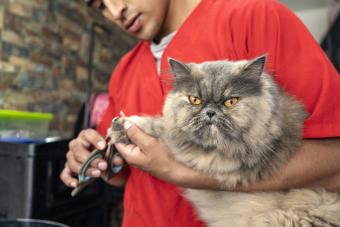
Cats aren't known for being fans of water, though surprisingly, many of them do actually enjoy it (on their on terms, of course!). All cat owners should know when to wash a cat and be familiar with alternatives to a full bath if necessary. While the mere thought of giving your cat a bath might feel intimidating, there are valid reasons to bathe your cat.
When Does a Cat Need a Bath?
Some issues can make baths necessary for cats, but it's usually not a regular thing.
1. Treating Parasites or Fungus
One reason to bathe a cat is to help get rid of parasite infestations. This can include fleas, mites, and fungi like ringworm. Your veterinarian will recommend special medicated shampoos for these conditions.
Generally, you shouldn't need to bathe a cat with fleas if they are being treated with oral and topical medications. In fact, some topical flea treatments shouldn't be applied within 24 hours of a bath. But sometimes, the amount of fleas on the cat or kitten is so severe that a bath is needed to help remove the fleas immediately.
2. Alleviating Allergies or Dandruff
Cats suffering from skin conditions like dermatitis may need regular baths to help soothe their irritated skin. Bathing can also be very helpful in dealing with feline dandruff. However, too much bathing can have the opposite effect and potentially make your cat's skin more irritated or dry. Make sure you're using the proper products, and consult with your veterinarian on the frequency of your bathing schedule to help your cat stay comfortable.
3. Removing Toxic Substances
Another reason to bathe a cat is to remove any substance that comes into contact with their fur and could be toxic. This can include almost anything that your cat gets into in the home, in your garage, or out in the yard, such as lawn and insect chemicals, anti-freeze, motor oil, poisonous plant secretions, and household cleaning supplies. You'll need to bathe your cat to remove the chemicals to keep them from hurting your cat's skin or to keep the cat from licking and ingesting them.

Keep in mind that the decision to keep your cat indoors all the time will reduce the need to bathe them whereas an indoor-outdoor cat has more chances to get dirty and may need baths more often.
4. Helping Your Cat With Physical Limitations
As cats get older, they have less mobility and may find it harder to clean themselves on their own. If the cat has physical health conditions, such as arthritis or lameness, or if they're overweight, they'll have a much harder time with their own self-cleaning regimen.
If your cat has medium or long hair, they'll especially need help cleaning areas they can't reach. Some cats also just aren't very good at cleaning themselves, whether it's just a natural lack of good hygiene or an underlying behavior reason.
5. Reducing Shedding and Allergens
Bathing a cat can lead to less shedding. If you combine a bath with regular brushing, it can reduce their shedding even more. If you live with someone who has allergies, bathing the cat regularly can help alleviate some of their symptoms.
6. Caring for Certain Breeds
Certain breeds and types of cats, like hairless cats, require regular bathing, whether it's twice a year or more. Cats that have medium or long hair may need baths with a de-matting shampoo to help remove dead hair and keep from getting mats. They also may need help with areas like their anal region, where feces can accumulate because it's a harder-to-reach area.
Hairless cat breeds may require weekly or monthly baths to keep their skin in good condition.

Alternative to Cat Baths
If your veterinarian doesn't believe that a full bath is necessary, there are other options to help keep your cat clean. These should be discussed with your veterinarian to make sure that you are using the proper supplies and not missing out on anything your cat may need for their specific medical conditions.
1. Dry Shampoo
If your cat despises water with a passion and bathing them is a stressful activity for both of you, using a waterless shampoo is a good substitute, assuming your cat doesn't need any special shampoos from your veterinarian.
- Some waterless shampoos are in the form of a foam that you should spray onto your hands and then rub into the cat's fur and brush out.
- You can spray it directly onto the cat, but a more nervous cat may feel more comfortable not having a strange substance sprayed on it.
- Other dry shampoos come in the form of a spray that you use on a soft wipe on the cat's body and let it dry naturally.
Only use a waterless or dry shampoo that's designed especially for cats.
2. Cat Wipes
Another option for cats that hate water is cat wipes that can be purchased at your local pet store or through many veterinary clinics.
- These can be less stressful for the cat and even for cats that like baths, wipes can be very handy in cleaning some areas that need extra attention, or for the occasional spot-cleaning.
- Make sure that you use the wipes on a small area first to see if your cat's skin develops a reaction before using them all over the cat's body.
3. Brushing
Many cats, especially short-haired ones, can get away with just a really good regular brushing routine to stay clean and never need a bath.

- Brushing your cat's hair once or twice a week helps to clear dirt, dead skin, and hair from their coat.
- Medium- and long-haired cats may need brushing more often to stave off a bath.
- Your brushing routine should cover working on all areas of the cat's body from head to toe (or tail!), and use a proper-sized tool for your cat's type of fur.
- A cursory brushing will not be as effective, so plan on making this an activity with some dedicated time each week.
Tips for Giving Your Cat a Bath
When you give your cat a bath, you should avoid cleaning their head, ears, and face in the tub. It can bother the cat to have water around their eyes and facial region at a time when they're already very stressed. You also don't want to risk getting soapy water in their eyes and ears.
Use a Damp Cloth
The best way to clean the head is to use a warm and damp cloth and gently wipe around the face, under the chin, and behind the ears.
Avoid Shampoo on the Head and Face
Do not put any shampoo or soap on the cloth unless the face is really dirty, in which case you can use a very dilute solution of shampoo and water on the cloth.
Wipe Under Your Cat's Eyes
You can use the cloth or a damp cotton ball to wipe gently under the cat's eyes.
Use Cotton Balls for Ears
Use cotton balls to very gently clean the insides of their ears. You can use a clean, dry cotton ball or dampen it with a solution made specifically for cleaning a cat's ears.
Speak to your veterinarian about the right type of ear-cleaning solution to use. Do not use home remedies such as hydrogen peroxide, vinegar, or alcohol, and never use Q-tips.
If your cat is anxious during this process, try feeding them some excellent cat treats while you slowly clean their head, or have someone else feed the treats for you while you work on the cat.
Use a Professional Groomer or Vet
If your cat still needs a bath and you are unable to do it because the cat is too scared or becomes aggressive, talk to your veterinarian. Many veterinary clinics provide grooming services for their clients, and they can assist you with giving your cat a bath.
There are also professional groomers who can do this as well. If you choose a groomer, ask your veterinarian for local referrals and make sure the person is experienced working with cats, especially ones who aren't pleased with the prospect of a bath.
Keeping Your Cat Clean
While some cat owners may feel a sense of dread at the thought of bathing their cat, there are times when it will be unavoidable to keep your cat healthy. There are also alternative options that do not involve a full bath if your cat really hates water. If all else fails, talk to your veterinarian about having your cat groomed by the clinic staff or a professional groomer experienced with cats.






